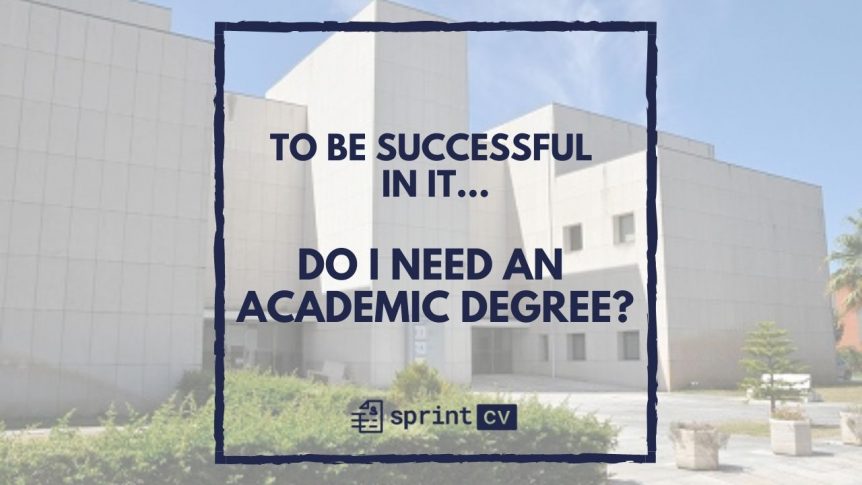
To be successful in IT… do I need an academic degree?
It’s very common to hear people debating on what’s more important: theory or practice? Having an academic degree or start having professional experience immediately? If these doubts ever crossed your mind, this blogpost will tell what I, founder of Sprint CV, consider are the pros and cons, as well as my personal experience on the matter.
What does it mean to have an academic degree?
An academic degree isn’t more than a certificate that proves you’ve attended classes for 3-5 years. These classes then allowed you to acquire a set of skills widely recognised by the industry and society.
Is it the only way to learn? I’m sure you know it’s not. Nowadays, we can learn everything by ourselves from books, videos, articles and by having professional experience. Even at the University, you need to be able to learn for yourself. I remember when I was studying at ISEC (Instituto Superior de Engenheiras de Coimbra) and the teachers would give an introduction about a topic, but the projects were built by ourselves.
This means that what the university teaches you is the ability to understand the problem, build a solution and apply it to the real world.
Do I NEED an academic degree to be successful in IT?
If you truly believe you don’t need it, then you don’t. The truth is: you don’t need an academic degree to be a great professional. What you need is to be eager to learn and improve yourself constantly.
As a professional, you should be learning all your life if you want to be great at it. Either it’s by yourself, with the help of other people that can teach and mentor you, or by taking courses. If you feel that you’re not learning anything, an alarm should sound in your head!
SHOULD you have an academic degree?
In my opinion: yes! Here’s why:
- Having an academic degree remains a requirement in many recruitment processes. “Old school” institutions still exclude the ones that don’t have one;
- It gives you a wider perspective on how to solve a problem. As a professional you should have different tools at your disposal to creatively find solutions;
- You can study and work at the same time. After work classes are a great way to learn the theory and apply it in your professional life;
- You will have some of the best moments of your life! New friendships, almost no responsibilities, going to Erasmus! Especially if you think that when you start working, big responsibilities will come – and you will miss university life!
- It’s never too late to learn! If you didn’t enrol on a course after high school, there are still great opportunities waiting for you. More than that, you have the wisdom to decide what your expertise will be: management, finance, etc. – check what’s better for your career goals. This will also open a wider range of job opportunities – maybe you’ve been a Java Developer for years but now that you like to be promoted to manager or head of department, you feel the need to acquire more knowledge within other areas.

ISEC – Computer science department
To sum up
When you have a vision of your professional career, you should define a plan to make it happen.
Your professional experience is determinant but having proof (academic degree) that you can actually do the job is essential in some cases. This is what gives the company that is hiring you the guarantee that they are making the right choice. Other times, experiences in, for example, building an app in your free time, your attitude and soft skills will be more important than just an academic degree.
Luckily, we live in an age where information is available to everyone and there are multiple ways to get to a certain career path. So, make sure that, whatever you do, you are comfortable with your choices and give your best!
Good luck!
 Marco Pincho
Marco Pincho
Founder of Sprint CV
Feel free to connect with me on LinkedIn.